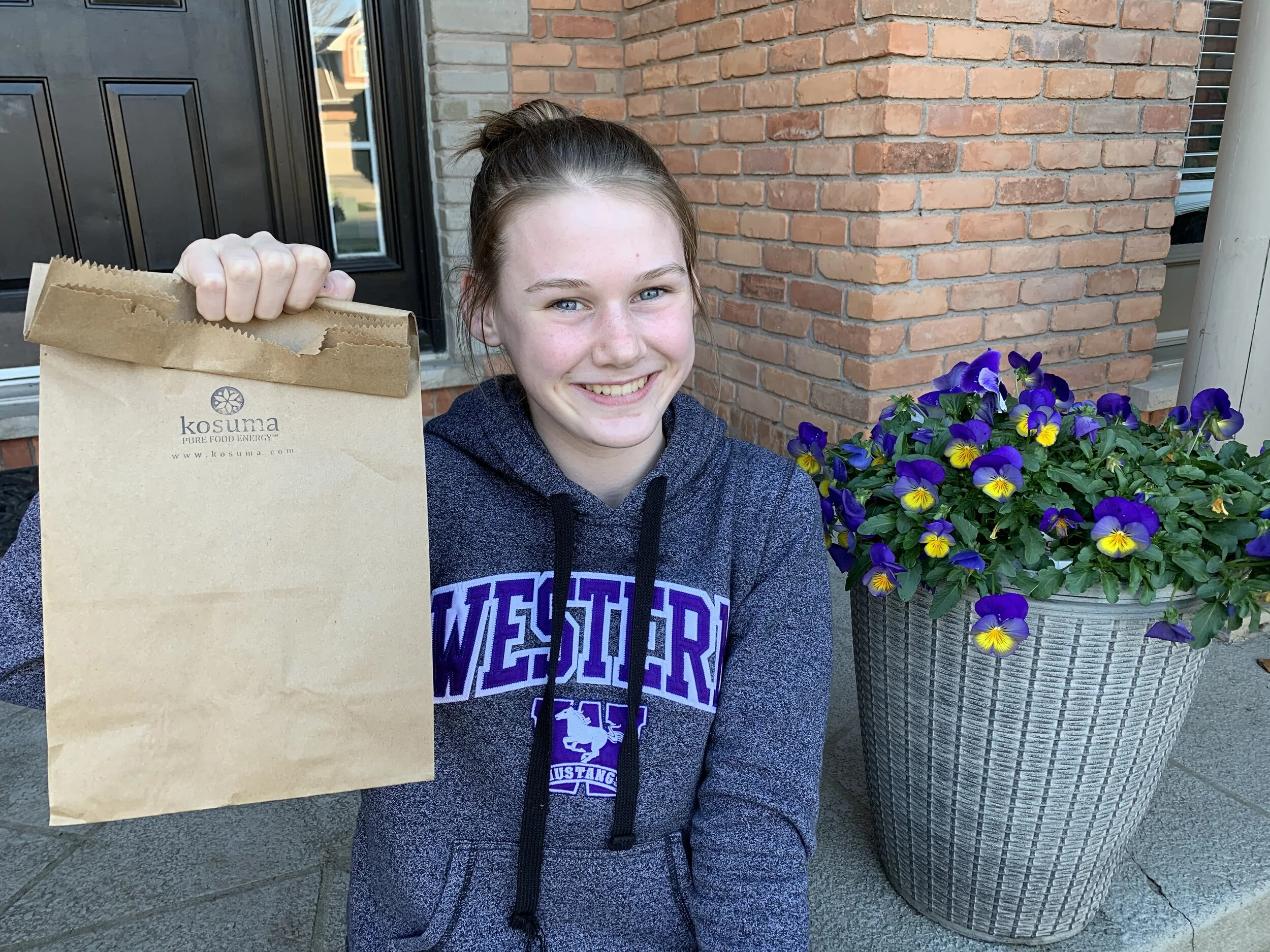Food for Thought: How the Pandemic is Changing Our Relationship with What We Eat
Sophie Mutch is a grade eight student at École Secondaire Catholique Monseigneur-Bruyère in London, where she has served as Student Council President and been a member of the volleyball, basketball, cross-country and track teams. She has a strong interest in music & theatre, too. Sophie is the first contributor to our new ‘young & free future’ series in which we provide grade eight students the opportunity to share articles on our website. This is the first of three articles that Sophie will be writing for young & free press.
During the pandemic, I have definitely noticed through speaking with my extended family and on social media that many people are stretching out their food supply as much as possible. This leads me to the following question: when things return to normal, will the same standard apply? When food items can be purchased in ample quantities whenever they are needed without any worry, will people continue to try to throw away as little food as possible, or will we return to a less thoughtful state? This will be fascinating to watch. How will local agri-businesses and markets adjust to the shifting behaviours of customers?
Let’s dig closer to the root of the issue. Why have flour, sugar, toilet paper and other necessities been cleared off the shelves at different times throughout the pandemic? The sense of scarcity is causing people to be afraid of not having access to these items if things got worse. When things do return to normal, will people continue to stockpile necessities in fear of another wave of COVID-19 or potential shortages in our food supply? While it is easy to stockpile non-perishable goods, what about fresh foods? How do we, as a society, avoid going to the grocery store and still keep healthy by eating good food?
The answer may be to renew our relationships with farmers through online ordering and pick-up or delivery options. Many local farms and bakeries are now offering pick-up from their location or delivery to your home. I believe that this is a great contact-free way to receive fresh food consistently with less worry about getting sick. The governments of Canada and Ontario are supporting this trend with a recently-announced $2.5M fund to help agri-food operators to expand online.
This strategy reminds me of what I’ve heard about food and drink delivery in the 1950s and 60s. During this time, many people received milk from milkmen, who would deliver fresh milk to specially-built ‘milk portals’ at private homes. However, as motorized vehicles became more popular and it became easier and cheaper to buy milk from the grocery store, this service became obsolete. Now, it’s back baby! The technology has modernized, of course, as many businesses have customers order through e-commerce sites, apps, or email. What should we call the people making the food deliveries now? The Produce People?
The immediate positive outcome of this approach is that these businesses can continue to generate revenue. Many small farms and bakeries would usually sell inventory in retail shops or at outdoor markets, which are currently either closed or trying to adapt to physical distancing requirements.
The food delivery trend has been building for a while. One produce farmer to check out would be Andrew Meehan of SunGold Market Garden in Mount Brydges, Ontario. He creates mystery-box type produce boxes and customers subscribe to the service. The boxes are comprised of the cream of the crop for that week from SunGold and sometimes surrounding farms. Deliveries are limited to London. The boxes are currently sold out for the month of May, but follow them on Instagram to be notified when they restock for June! Many other farms have been using such a model of Community Shared Agriculture with success in our region for several years. Check out Common Ground Farm near St. Thomas as another good example. The pandemic may just accelerate this trend and bring more and more ‘Produce People’ into the pick-up or home-delivery business.
Looking for some sweet treats? Morsels is taking orders by email, and The Welsh Baker through the company website. Morsels is offering pick-up and delivery, and The Welsh Baker is providing free delivery to London and St Thomas. For a gluten-free option, go check out Helm Baked … you can order gluten-free or regular baked goods by Thursday evening to receive the baked goods on your doorstep on the weekend!
Finally, Kosuma Energy Bar sells all-natural handmade bars, which come in packs of twelve. You can order variety packs or pre-packed boxes on their website. Under normal circumstances, Kosuma Energy Bar sells their products on the first floor of The Market at Western Fair District, but have shifted by adding online sales and offering free delivery to London and St. Thomas.
How can teenagers benefit from this situation, besides eating our veggies and indulging in a few treats? Well, as we now have a good amount of time on our hands, what better way to spend it than outside, and how about in your own yard? Heeman’s is selling potting soil and plants as part of their farm pick-up service. This is a great opportunity to get outside and plant your own garden! Will the pandemic spark a long-term trend of more families establishing gardens and producing their own food? Community gardens have proved important, too, with the provincial government recently deeming these spots as essential.
Here is author Sophie Mutch standing next to the big sign at Heeman’s on Nissouri Road east of London.
If we fail to support farmers and others in the food sector, what would be the possible impact? Well, that got me thinking. Farmers and food processors produce our everyday essential food items. If small farmers are not properly supported during this period, they might not be able to continue after things return to normal. By possibly losing local farms, we would be losing access to many important food items that are produced nearby. You just can’t beat the crunch of ultra-fresh produce! Larger farms have a host of challenges, too, including how to keep seasonal workers safe while living and working on farms. The provincial and federal government have offered some help, but agriculture is a diverse industry that requires lots of different supports at various times. We may feel the impact of the pandemic on our food supply for years.
Without doubt, our relationship with food will change through this experience. Many local food businesses are responding with creativity and innovation. There are a number of ways that teenagers can support them, including ordering food online for delivery and starting to build relationships with local Produce People! Why not take a shot at planting a garden, too?







